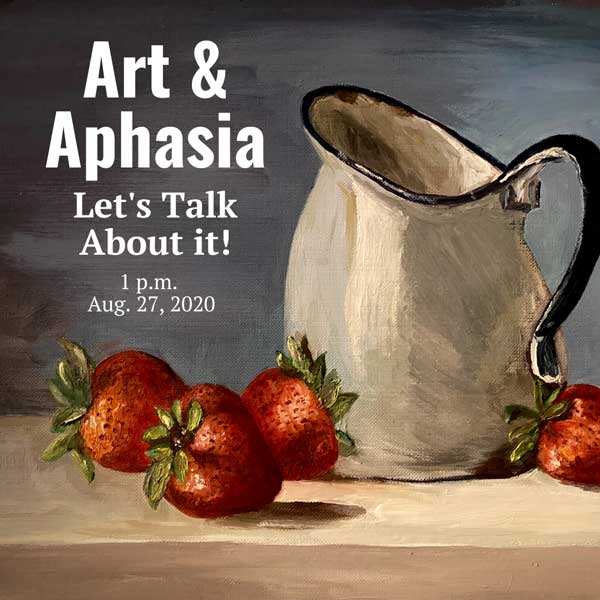Art can help us both express and see life in a different way. When aphasia is part of the story, art can take on additional importance and can help someone with the communication disorder have a conversation without words. Show us your art — something you’ve made, a favorite work by one of your favorite artists, something that inspires you. Then we’ll talk about:
- How does it make you feel?
- How did you feel while you were creating it?
- What was the inspiration behind it?
- Did you see it on a trip to a museum in a foreign city?
Help us see through your eyes during the aphasia social hour scheduled for 1 p.m. Thursday, August 27, 2020.
When and Where – How to Register
The aphasia social hour is scheduled for 1 p.m. Thursday, August 27, 2020. The event is free and open to anyone in the #aphasia community, however, you must register to participate. Register via the form here: Aphasia Social Hour Zoom Registration (8/27/2020)
What to Expect
The social hour is typically 40-65 minutes long and includes interaction with others with aphasia as well as carepartners. It’s a great way to stay social and to practice communication skills in a low-pressure setting. This is a free, voluntary social hour and is not therapy or offered in place of therapy. This is a planned series. We will host regular social gatherings, workshops, and Q&A sessions.
New to Zoom or Online Teleconferencing?
Check out our Aphasia-friendly guide to using online meeting software: UMAP’s Guide to Joining Zoom from a Computer.
The University Center for Language and Literacy (UCLL) is committed to helping people of all ages find meaningful ways to communicate. UCLL is part of the Mary A. Rackham Institute (MARI) at the University of Michigan. MARI provides high-quality, individualized mental health, neuropsychological testing, and language and literacy services to the community through its service centers, including UCLL, University Center for the Child and Family (UCCF), and University Psychological Clinic.

